The complete guide to home viewing
Get Screen Gab for everything about the TV shows and streaming movies everyone’s talking about.
You may occasionally receive promotional content from the Los Angeles Times.
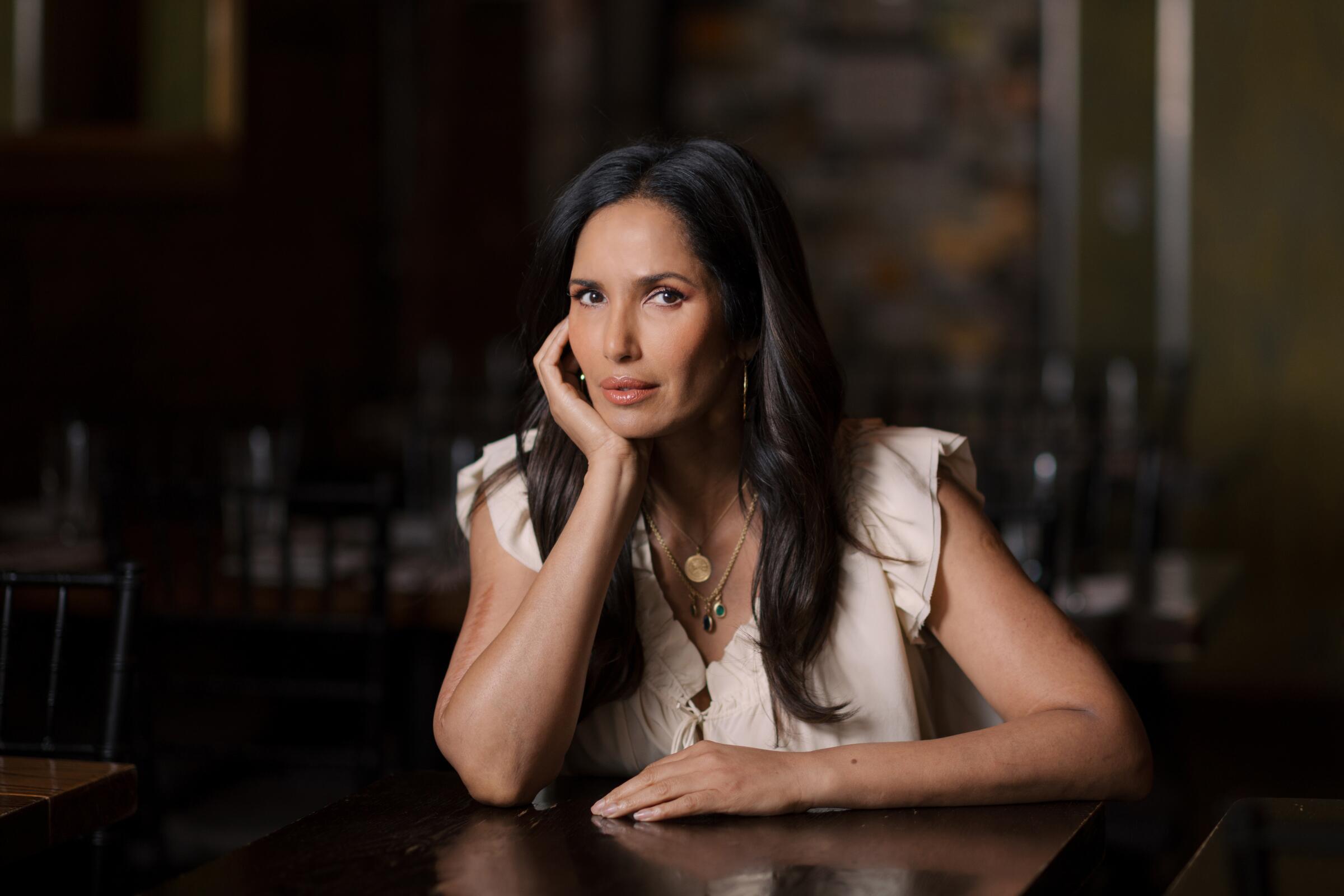
“This was a really tough decision,” said Padma Lakshmi, seconds before announcing the winner of “Top Chef: World All Stars” during Thursday’s season finale.
The sentiment also applies to last week’s bombshell news that the 20th season of Bravo’s reality series would be the Emmy-nominated host and executive producer‘s last.
“After much soul searching, I have made the difficult decision to leave ‘Top Chef,’” Lakshmi shared on Instagram. “I am extremely proud to have been part of building such a successful show and of the impact it has had in the worlds of television and food.”
The news came as a shock to many “Top Chef” fans, for whom Lakshmi’s presence on the cooking competition has been as central to its acclaimed run as that of head judge and celebrity chef Tom Colicchio or ingenious, perennial challenges such as the mise-en-place relay or Restaurant Wars.
One of the few Indian American women on television throughout her 19-season tenure, Lakshmi became known for her low-key banter, love of bold flavors and fearsome critiques of chefs who dared to try Indian dishes and fell short. In the process, along with multiple cookbooks, a memoir, her acclaimed Hulu docuseries “Taste the Nation” and more, she established herself as one of the most influential figures in American food.
Days after her announcement, Lakshmi got on a video call with The Times from her home office in New York City. Over a warm bowl of ribollita and with her dog Davina by her side, she divulged what spurred her sudden exit, which chefs prepared her most memorable meals, who she’d like to emcee “Top Chef” next and how her 17-year run on the culinary competition set the table for what’s ahead. The following conversation has been edited for clarity and length.
By embracing health and safety restrictions, Bravo’s cooking competition brilliantly highlighted its strengths — and turned lemons into lemonade.
How have you been feeling since making the announcement last week?
I feel a little shaky, because it’s been so emotional. I’m gonna be honest with you: I was really scared to do this interview because I’m just still so raw. I just walked away from a 17-year-old institution that was such a large part of my life — not only my professional life but my public life and my personal life.
And it’s daunting because I feel very responsible to the 140 people who are like family, who I have grown up with and look forward to seeing every year for seven or eight weeks like a reunion. During my time on “Top Chef,” I lost a lover to cancer, I’ve gotten divorced. [My daughter] Krishna grew up on that set — for the first seven years of her life, she sat on my director Ariel Boles’ lap because she loved all the monitors in video village. I’ve gone through everything with these people. That part is really hard. For a long time, I didn’t want to leave because their jobs are my concern too.
Did you film Season 20 knowing it would be your last season?
No. But I thought it could be.
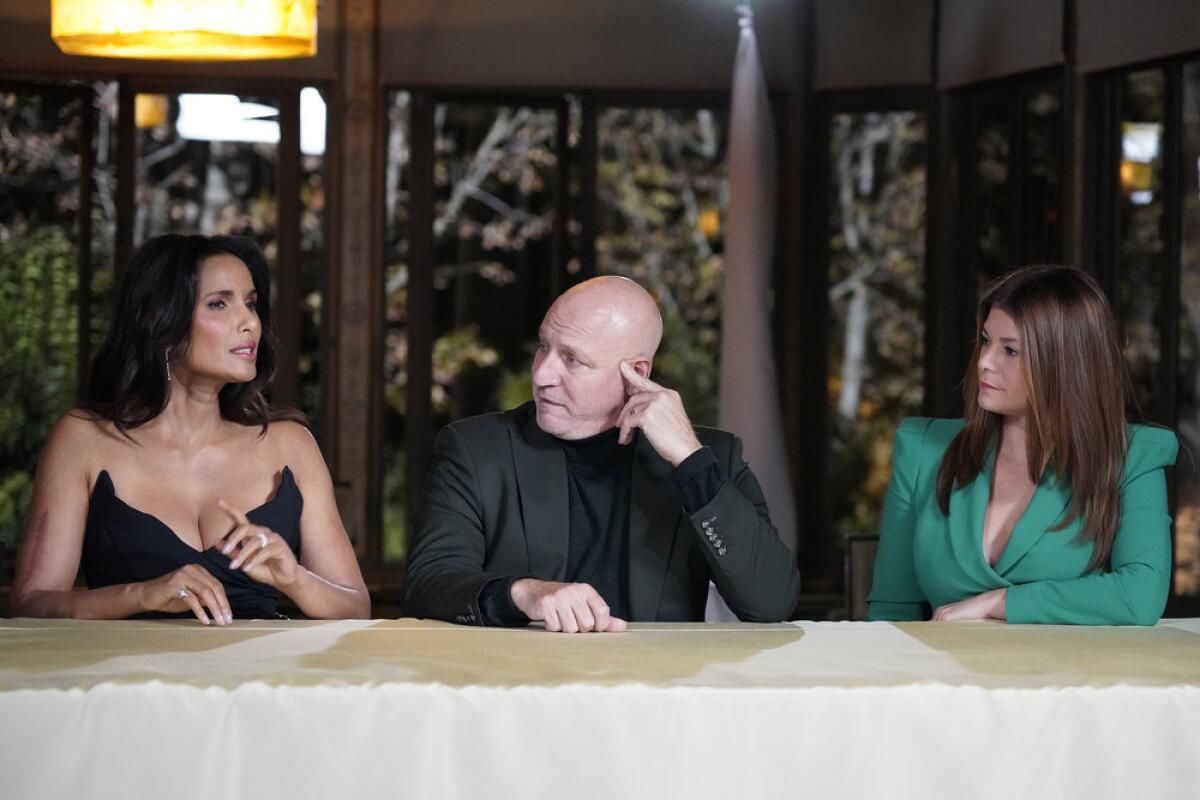
Why are you leaving the series?
There were a whole lot of complex factors that went into this decision. The biggest one is “Taste the Nation,” which consumes me in the best way, intellectually, spiritually, creatively, and I just want to keep making it. Other than writing my memoir and editing the anthology [of travel essays], it has been the most gratifying work of my life. I love both shows for very different reasons, and I’m very, very lucky to have two hit shows on TV at the same time. That’s like lightning in a bottle — I felt like, how could I give that up? You know, because Hollywood likes to keep you nice and scared.
Last year, my grandmother died. She practically raised me. A week after, I had to go and film “Taste the Nation,” which was honestly the best thing because it kept my mind occupied. It’s OK because it’s one week out on the road and then one week off, where I’m working to set up the next week but at least I get to sleep at home with my kid. We went away for a week for spring break; we had two weeks away in August. And then, bang, I was on the set of “Top Chef” from mid-August until October. So I was on the road from February to October. And I was exhausted. I just want to enjoy my life a little bit.
That’s not to say I don’t want to do more projects. But I also don’t want to eat like I do on “Top Chef” anymore. I’m the only one on the show that eats every single thing. I did it for a long time, and I don’t think that is sustainable for me.
Looking back on your 17-year run, what are you most proud of?
The food media landscape and just the way the world looks at food has really been impacted by this show, and I’m proud to have had something to do with that. Television has changed so much, but back in the beginning, we didn’t want it to be on one of those lowest-common-denominator shows, humiliating the contestants or making it gossipy and not about the food. That made all of our skin crawl. I’m extraordinarily proud that the real stars of our show are the contestants, and that’s not an accident.
I am forever grateful to every contestant that has walked through those kitchen doors, because I would never, ever put myself in that position, not for all the money in the world. Because as hard as it looks on TV, it is way harder — physically, psychologically, emotionally — and I feel super bonded to them because I’m standing there witnessing it all, every single day of the competition. I see their faces day in and day out, I see them develop, I see them get in their own way. It has been the privilege of my life to watch each and every contestant do their best, give their all, hold their hands, wipe their tears, laugh with them and cheer for them.
You joined “Top Chef” after a career in modeling and hosting numerous other food shows. In the early seasons, were you often dismissed by the chefs or guest judges?
Yes. And I’ll leave it at that.
When do you feel like the industry finally began to recognize you as a legitimate presence?
It wasn’t overnight. The start of it was when Éric Ripert, who had already been on the show a few times over a few seasons, took me aside. He’s pretty reserved, but I think he felt like I was having a hard moment. He said, “Padma, I’ve gotten to know you now, and you have one of the most sensitive, nuanced palates I’ve ever encountered in my life. Just because you have not worked in the back of a restaurant, don’t think that you don’t belong.” It was a very generous, discreet thing that he said, because of what he observed. I’ll never forget it.
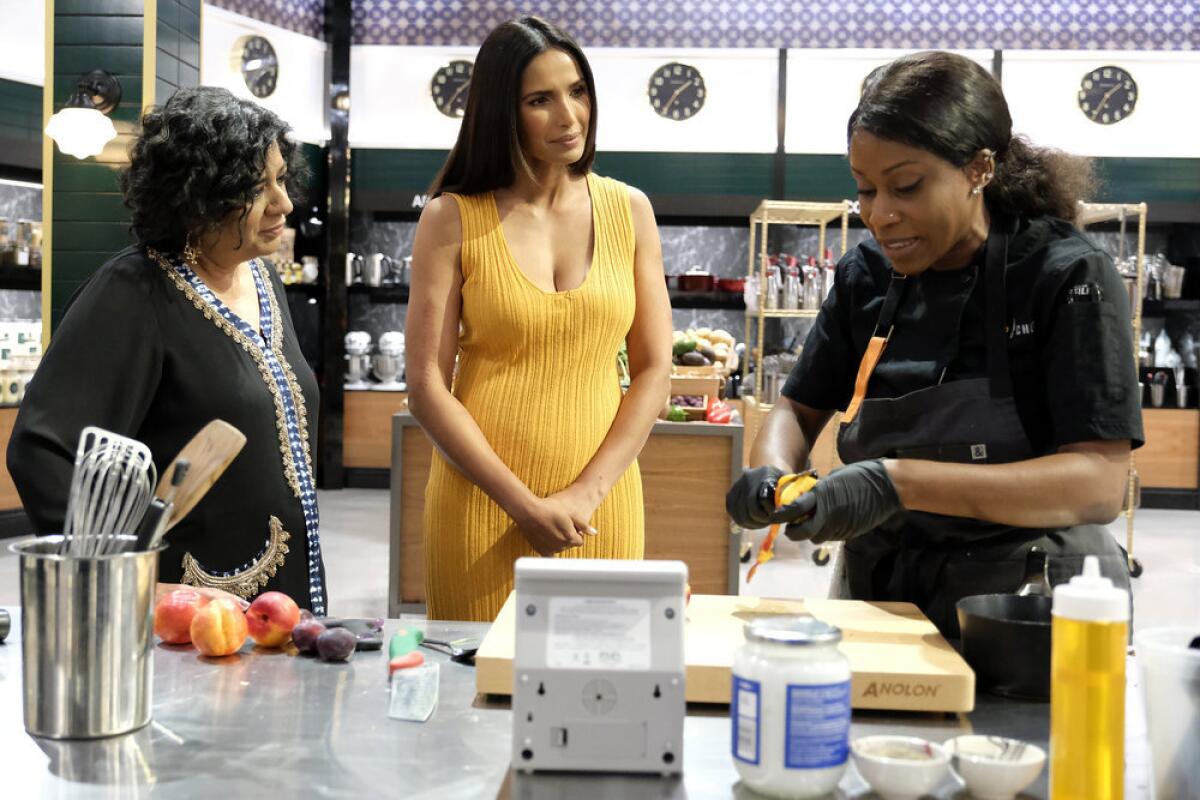
I loved that your final season included an Indian food challenge.
Finally! I loved the Thali challenge. I kind of felt sorry for all of my chefs because it’s a hard thing to make those seven different dishes; it’s like making Thanksgiving dinner on one plate. And Asma Khan is such a great chef and it was delicious, but these chefs are just hanging on your every word about the principles of Ayurveda, trying to absorb everything and memorize everything so they can then do it themselves. Of course, they’re not gonna nail every dish. I could tell they were having a hard time, but I can’t be helping them or giving them any clues.
It frustrated me that they only had that one example of dal — it’s like our comfort food, the chicken soup of the subcontinent. It’s something I make really well; home cooking is different, no matter how great the restaurant is. Also, I wanted to do something nice and nurturing for them, especially since I can’t even hug them because of the COVID protocols.
So while they were cooking, I went into our culinary department, grabbed a bunch of things and cooked a huge pot of dal, between getting my makeup touch-ups and my hair poofed out. After they fed us and the competition was over, I brought out the dal, plain rice and a bunch of bowls for them. Buddha [Lo] was shoving it in his mouth and he said to me, “That’s the best thing I’ve had in London yet.”
What fine-dining cliché are you personally OK with no longer tasting on a regular basis?
I’m sorry, I’m not a big fan of foie gras. I don’t like a lot of organ meat. And I’ll be fine if I never have a foam again.
‘Top Chef’ host Padma Lakshmi immerses herself in immigrant and ethnic foods — and communities — for ‘Taste the Nation’
What are some of the most memorable meals you’ve had over the past 17 years?
Good or bad? I can count on one hand the times I’ve spit something out, because I feel horrible about it. I want to die because I know how much heart and soul they’ve put into it. It’s always been because an artichoke isn’t cleaned properly or chicken is raw in the middle. Still, my all-time worst dish was [in Season 2] when Ilan Hall did this beautiful, exquisite, glossy, perfectly dense chocolate ganache with liver inside. And then there’s Ariane Duarte’s dessert [in Season 5], some kind of lemon curd filling in a martini glass. I swallowed one bite and it was too sweet; you’d think I put some nuclear substance in my mouth. And Michael Midgley rushed the vending machine challenge [in Season 2] — I hate that dish because it’s him trying to be like, “I’m too cool.” I cannot abide that — either be here and be all in or don’t be here. You’re the one who’s gonna look like a jerk.
Yikes. How about some of the best bites you’ve eaten on the show?
Some of the best dishes were from the Houston barbecue challenge [in Season 19]: Buddha did this beef dish with raw beet petals that was the perfect raw counterpoint to something so rich. It was so beautiful but not sterile like other high-end food; it was homey with all the tang and depth of flavor that is the beautiful messiness of barbecue. That season, Evelyn [Garcia] did a tribute to Selena that was literally just an aguachile but it was so good.
Fatima [Ali] had a deconstructed samosa [in Season 15] with all of those combustible flavors and textures in your mouth at once: the zing of the hot and sour mint chutney, the sweet tang of the tamarind chutney, the background warmth of the cumin and coriander seed, the buttery soft boiled potato, the cooling yogurt and the crispy crunch of the flaky pastry broken around it. It had so much to it and it was so beautiful, it took me back to my childhood with my grandparents in New Delhi.
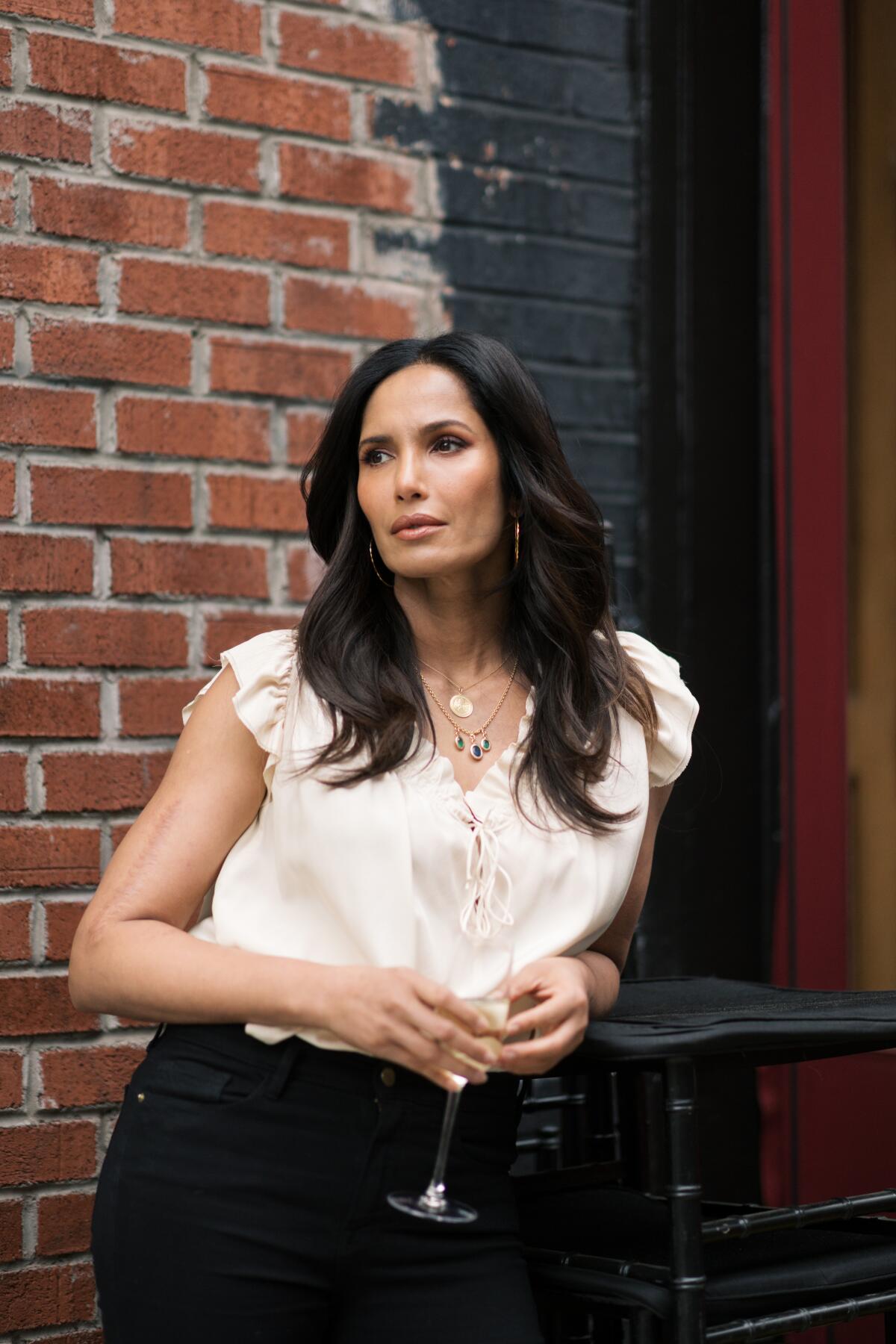
That’s why, later in that season, you see me take her to task. She wanted to do fine-dining food and I’m like, fine, but bring your heritage to that. It’s probably the harshest I’ve ever spoken to a contestant, but it was because I knew she was capable of so much and, like me, she was going to be looked at by a lot of little brown girls. She understood that, and I understand that every day.
I was at the “Never Have I Ever” party with literally 400 young Indian, Pakistani, Bangladeshi women, and it was the first time I had really been out in public since announcing, and it was overwhelming. I was tearing up. Women stopped me in the bathroom to say, “Thank you for teaching me everything I know about food.” Another woman said, “You’re the only brown woman I’ve ever seen for most of my childhood.” [Over the years] people will stop me in the airport and ask me, “What shade of lipstick is that? What foundation are you using? Because I’m brown too.” That makes me really proud of this legacy.
Over the years, I appreciate you always holding chefs accountable for their badly cooked rice. It happens so often.
I know! Like 40% of the human race eats it every day. It’s because most of the fine-dining restaurants in North America are built on Western cuisine and French technique. That’s also what I’m purposefully highlighting in “Taste the Nation,” which was born out of all of my frustrations, hopes, loyalties, advocacies and political point of view. Food is emotional, with so much heritage and culture and family ties, but it’s also deeply connected to history, politics, economics and the environment.
I wanted to be as serious about the food as I am on “Top Chef” while exploring all of that; I wanted to go to where it’s being made and see all of the attachments in its natural environment. But I don’t want every episode to just be, “Go to this community, meet everyone and talk about their food, and then rinse and repeat.” That’s good for four or five seasons max. I want to be doing this show for as long as I did “Top Chef.” It’s “Taste the Nation” but it could be any nation; I want to go international, like to Berlin, where there’s a huge Turkish immigrant community. There’s more migration now than any other time in our history, and I want to be at the forefront of that.
It’s so nice to see you be so expressive and animated and sometimes even cursing while eating on “Taste the Nation,” where you aren’t judging the food.
In the early seasons of “Top Chef,” they wanted me to be very closed off and serious, and it pissed me off that people would say, “You’re so nice in person!” They don’t say that anymore, but “Top Chef” is so formatted, and because I’m also the host of the show, it’s my job to facilitate other people’s opinions, especially those of the guest judges and personalities, often at the expense of sharing my own.
I wanted to be my full self on “Taste the Nation.” I’m tired and sick of seeing men get to be callous and smart and funny and dirty and sexy and mean, and all of us women have to sit there, look pretty and be likable. And I hate to start sentences like this, but in my business, as a brown woman in Hollywood, I know how rare it is to get to make a show out loud from the ground up, to have the reins of the show creatively, and this is the first time in my life I’ve ever gotten this privilege. It’s a miracle to make a show that comes out exactly how you hoped.
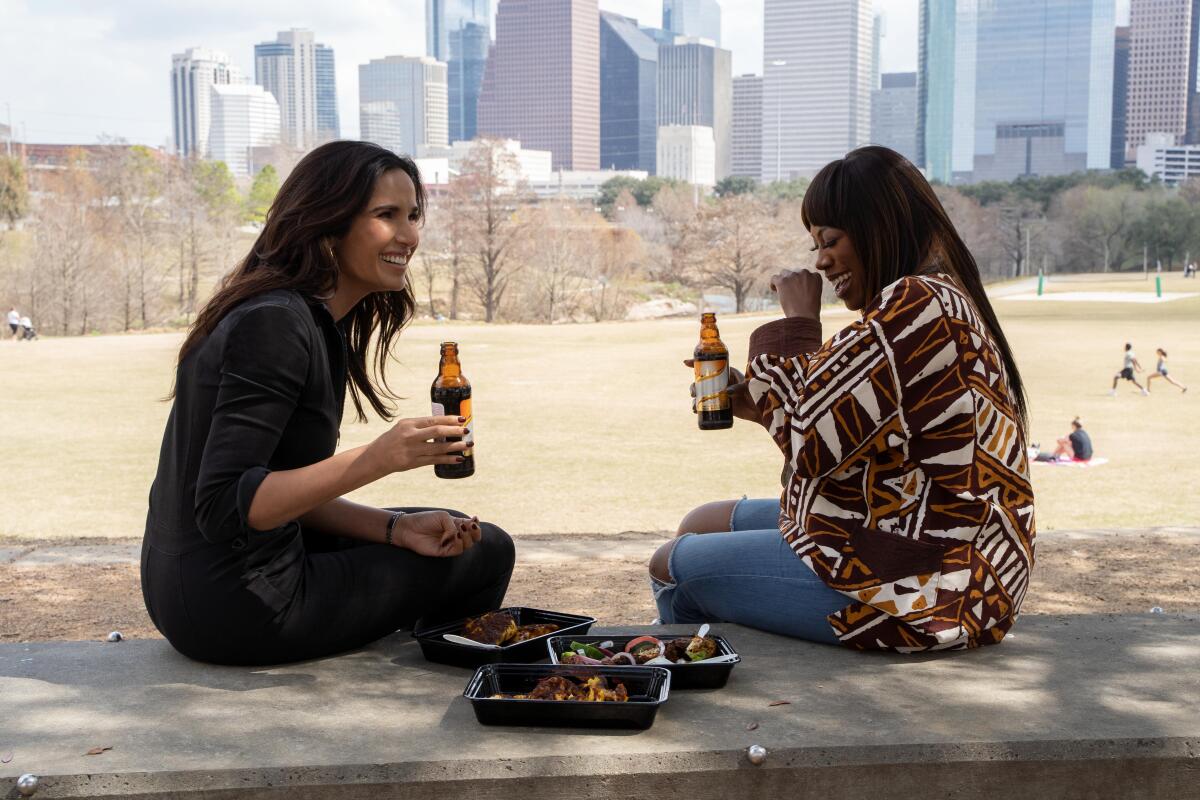
What production lesson did you learn from “Top Chef” that you implement on “Taste the Nation”?
The only other person who’s eaten almost every dish on “Top Chef” is the camera operator. I would hang out while he photographed it as a still because afterward, we would often compare notes, and I would see how that food fared after it sat. Food is an organic compound: it congeals, runs, discolors and oxidizes over time and because of the conditions in the kitchen you’re shooting in. Observing all of that helped me a lot.
I remember one time [in Season 9] when Charlize Theron came on. I think her team wouldn’t let her shoot unless they had a key light on her, so they had to jigger this key light. And then I got mad and I said, “Why don’t I have a key light? I’m your leading lady, I’m a brown woman, I need more light than Tom [Colicchio]. Cameras are not made for my skin; they’re made for [fellow judge] Gail [Simmons] and Tom’s skin and that of every other white person in the world.” And so they finally positioned this light with a megaphone shape to only give me the light I needed.
And there are so many things that are out of my control on “Top Chef,” but on “Taste the Nation,” I am in every color-correction and sound-mixing session in postproduction because I’m so persnickety about things like how raw shrimp looks onscreen. It allows me to sleep at night.
The 20th season of Bravo’s hit reality competition series, the first to take place entirely outside of the U.S., will feature chefs from earlier seasons and global editions of the show.
Any tips for the next “Top Chef” host?
I stand for hours in stilettos on concrete, and it took me 10 seasons just to get a rubber mat under my feet, so make sure they give you that rubber mat. If you’re darker-skinned, make sure your key light is positioned properly. Don’t go to set with an empty stomach, because sometimes they’re delayed hours before you start filming. I used to do that because I wanted the contestants to have the full audience of my appetite, but then two hours would go by before a Talenti ice cream dessert challenge, and you’re so hungry and scarfing it down and then you feel sick on the fifth dish out of 16. Eat something very mild and simple like yogurt or cottage cheese or toast, something that won’t fill you up but is going to tide you over. And do not wear something super tight, because it will only get tighter by the time you get to the 14th contestant.
If Bravo recruits the next host from within the “Top Chef” family, who would you recommend?
I don’t want to piss anyone off. [Past contestants] are all like my children. There are a lot of great people, like Melissa King and Kristen Kish, who have other shows. Carla Hall would be fantastic. Either Gregory Gourdet or Kwame Onwuachi could do the job because they are the hottest chefs in the world right now, and we don’t see enough Black men in roles at the forefront of the professional food world, even though Black men and women have been making most of the food in this country historically. Kwame is charismatic and funny; Gregory is thoughtful and has a lot of empathy.
And I think Gail could be great too. We have grown up together on this show, and she certainly knows how to handle all the complexities that sit between us [at Judges’ Table]. Maybe the solution is to have Gail take my chair, and then you could have a permanent position that only alumni get to take.
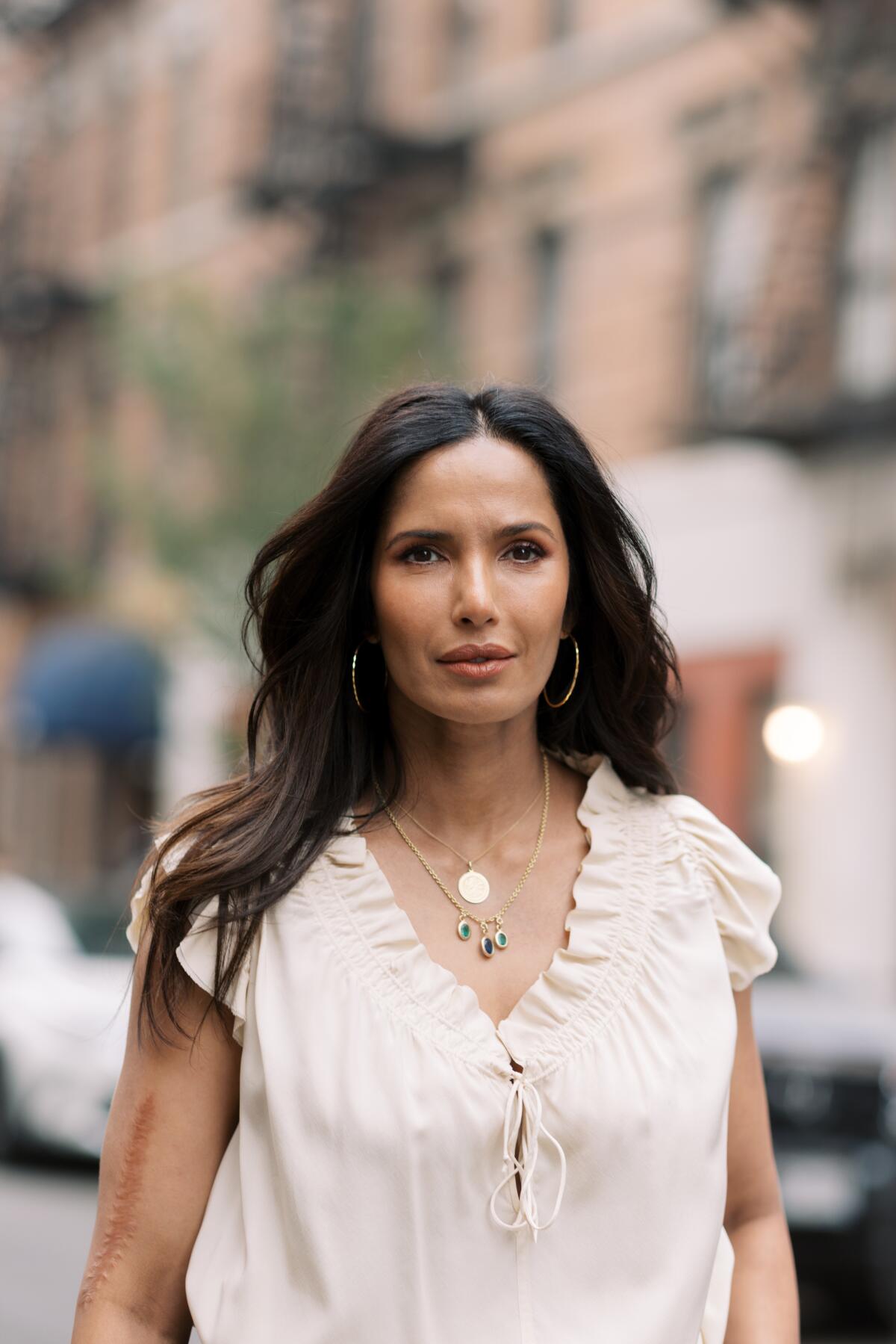
The complete guide to home viewing
Get Screen Gab for everything about the TV shows and streaming movies everyone’s talking about.
You may occasionally receive promotional content from the Los Angeles Times.